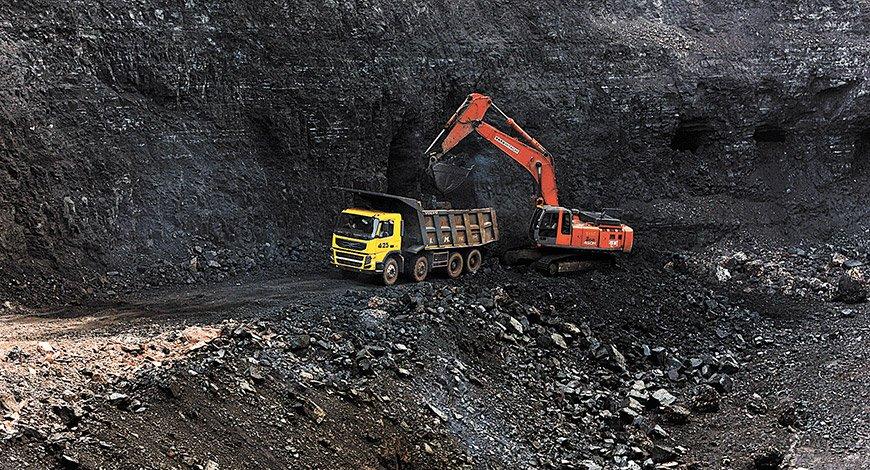Meghalaya: Scourge of Illegal Coal Mining Persists Despite Ban

New Delhi: Illegal coal mining operations allegedly continue to prosper in Meghalaya despite a ban imposed upon its extraction in the state seven years ago. On January 21, six persons were killed in an accident at an underground mining pit in the East Jaintia Hills district in Meghalaya, thereby bringing back the focus to allegations of rampant illegal coal mining.
Earlier, in December 2018, at least 15 mine workers were reportedly killed in an illegal coal mine in the same district after the pit in which they had been working was flooded with water. As per the Meghalaya government no leases have been awarded for coal mining anywhere in the state. However, experts say that all forms of coal mining taking place in Meghalaya at present are illegal. Activists, on the other hand, say that since coal mining takes place away from the gaze of law-enforcement, workers are exposed to hazardous mining conditions and are forced to work for abysmally low wages.
Coal mining in the country is to be governed under the Mines and Minerals (Development & Regulation) Act, 1957 (MMDR Act). “This Act requires the formulation of a mining policy and mining plan by the state government which have to be subsequently approved by the government of India. It also requires one to obtain a license from the government of India to mine coal,” said Brojendra Prasad Katakey, former judge of Gauhati High Court.
The former judge had headed a panel appointed by the National Green Tribunal to inquire into issues of illegal coal mining in Meghalaya. The tribunal had imposed a ban on coal extraction as well as its transportation in Meghalaya by an order issued by it in November 2014. However, the Supreme Court, in a landmark order in July 2019 revoked the ban while upholding individual and community rights over mineral resources in Meghalaya whereby land owners were allowed to extract of coal under the MMDR Act. The apex court had directed the state government to hand over the illegally extracted coal to public sector major Coal India Limited.
“In July 2019, the Supreme Court said that due to the peculiar land ownership system in Meghalaya, coal does not automatically belong to the state but to the individual land owner. The Supreme Court, while vacating the NGT’s ban order, laid down certain conditions, including undertaking of coal mining activities under provisions of the MMDR Act and following of environmental laws. Environmental laws require obtaining consent to establish and operate mines from the Meghalaya State Pollution Control Board. Admittedly, so far none of the provisions under the MMDR Act have been followed. No consent for coal mining has been obtained either from the pollution control board. Any form of coal mining activity in the state at present, therefore, is illegal,” (Retd.) Justice Katakey told NewsClick.
The accident at the mining pit on January 21 also comes on the back of state government claims that no illegal extraction activities are underway anywhere in Meghalaya and that there was no unlawful movement of coal-laden trucks. In October last year, Meghalaya Chief Minister Conrad Sangma had claimed that allegations of illegal coal mining in the state were politically motivated by the Congress which was in opposition.
However, the NGT-appointed panel had documented extensive illegal coal mining in the state in the six reports that it had submitted till December 2019 whenKatakey stepped down citing the “non-cooperative and adamant nature of state government officials”.
In its fourth report to the green tribunal in August 2019, the panel noted that large-scale illegal coal mining in Meghalaya “before and after imposition of ban by the Hon’ble NGT in April 2014 resulting in huge damage to the environment has continued mainly due to non-exercise of powers” conferred to statutory authorities in the state and central governments. The report also noted the failure on the part of the state government to take requisite punitive measures against persons involved in illegal mining.
“Except for 67 cases which have recently been registered by the Police under relevant sections of the MMDR Act against the persons involved in illegal raising and/or transportation of coal in the State, all other persons who raised huge quantity of coal, admittedly without any lawful authority have been allowed to transport, sale and retain the entire sale proceeds of such illegally raised coal. Even after five years from the day the ban on rat hole mining of coal was imposed by the Hon’ble NGT, the coal miners in the State continued to declare stock of coal purported to be extracted prior to imposition of the ban by the Hon’ble NGT (sic),” the report had stated.
The panel further noted that despite rampant environmental degradation caused by coal mines and coal dumps in Meghalaya, neither the Central Pollution Control Board nor the Meghalaya State Pollution Control Board filed a complaint against their owners and operators.
In its fifth report the committee noted how illegal coal mining has continued in order to meet requirements of fossil fuel in cement manufacturing and thermal power plants in the state, thereby causing immense damage to flora, fauna, rivers, streams, water bodies and the environment in general.
“In fact, ban on the illegal rat-hole coal mining in the State of Meghalaya came as a boon to these Cement Manufacturing Plants and Thermal Power Plants in the State of Meghalaya as it virtually exempted them from the requirement of payment of royalty, taxes and other statutory levies payable on more than two-third of the coal consumed by them (sic),” the report said.
In the sixth and final report the panel mentioned that illegally extracted coal is not only being used by fossil fuel-intensive industries in Meghalaya but was also smuggled across the international border into Bangladesh.
“The Committee is of the view that export of illegally mined coal to the Bangladesh in the guise of coal permitted to be transported/exported by the Hon’ble Supreme Court and the Hon’ble NGT from time-to-time and also as an overload, over and above the quality stated in the concerned Shipping Bills/Bills of Export and the Mineral Transportation Challans, has supported and sustained illegal rat-hole mining of the coal in the State of Meghalaya even after the same was banned by the Hon’ble NGT by an order dated 17.04.2014 (sic),” the panel said.
Activists also allege that mining activity has spawned a mafia that now operates in gross violation of all laws of the land. Noted anti-corruption activist Agnes Kharshiing had filed a Public Interest Litigation (PIL) in the Supreme Court last year alleging large-scale illegal coal mining in the state. The SC dismissed the PIL in October 2020 after Kharshiing sought its withdrawal so that she could file appropriate grievances before the NGT.
“Since all coal mining activity is surreptitious in nature, workers are subjected to untold misery. They work in hazardous circumstances like bonded labour without any safety gear or equipment. No agency is therefore liable for the pittance that is paid to them by the mine owners in terms of wages,” said Olivia Bang of the Delhi-headquartered Human Rights Law Network, a collective of lawyers and social activists.
The state government of Meghalaya, however, has claimed that appropriate measures are being taken in order to curb instances of illegal mining in the state.
“We have received certain applications for leases pertaining to legal coal mining which we have sent to the Union Ministry of Coal for prior approval under the MMDR Act. We have not granted any lease until now. The process has begun however,” said Dr C. Manjunatha, secretary, Department of Mining & Geology, Meghalaya.
A probe is also underway into the January 21 accident in which six men lost their lives.
“We are waiting for an official investigation report from the police department. Until then we cannot say how the accident took place and whether those killed were engaged in mining activity. We expect the inquiry report very soon. We are enforcing the MMDR Act in Meghalaya to control illegal coal mining. We have registered around 250 cases pertaining to illegal coal mining under the Act since March 2019. Several people have been arrested for illegal mining while trucks transporting illegally mined coal have also been seized,” Manjunatha told NewsClick
The writer is an independent journalist.
Get the latest reports & analysis with people's perspective on Protests, movements & deep analytical videos, discussions of the current affairs in your Telegram app. Subscribe to NewsClick's Telegram channel & get Real-Time updates on stories, as they get published on our website.
























